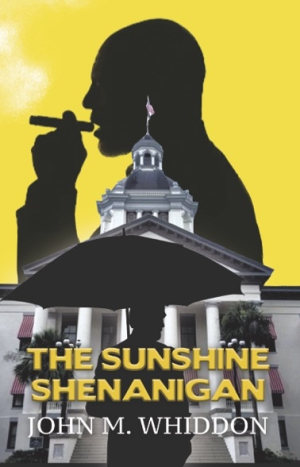The Sunshine Shenanigan
In the medical thriller The Sunshine Shenanigan, public servants rally to combat white collar crimes.
John M. Whiddon’s multi-perspective thriller The Sunshine Shenanigan follows a case of Medicaid fraud in Florida.
Inspired by corruption and abuse surrounding Medicaid payments in the 1980s through the mid-1990s, this spirited novel tracks Webb, the talented bureau chief for Florida’s Medicaid Regulatory Office. A former academic, he’s a leader who inspires loyalty and camaraderie among his quirky staff. He’s also on the cutting edge of figuring out ways to better detect fraud.
Meanwhile, in Little Havana, Jorge runs a pharmacy. He is a respected point of contact within the Cuban community. His friend, Marcus, is a special ops government employee who embroils Jorge in a questionable scheme. The nature of the scheme is revealed in a gradual manner, leaning into cloak-and-dagger humor.
This character-driven novel includes detailed background information regarding how people first met, their personal histories, and their habits. This coverage extends to employees of the regulatory office, and in related public health and government departments. It is thorough to excess. Still, their interactions are involving, mixing good-natured ribbing with a shared sense of purpose. Webb’s knowledge of the niche topic of Medicaid fraud is shared in an expository manner, but other people’s respect for him is palpable.
But as details repeat, as with those about the sources of Webb’s extreme wealth, interest wanes. And Marcus is an overblown lead with a complicated past—he doesn’t know who his parents are, speaks multiple languages, and nurtures his phenomenal memory via acquired techniques, resulting in bombastic, discursive scenes. And inconsistencies around the characters’ names muddies the task of tracking the cast.
As the story lines alternate, questions arise about the likelihood of their convergence, and about what Marcus’s scheme involves. The many minor characters further undermine the progression of the plot—including a bagman, a lawyer, and colleagues with tangential story lines. While these sketches are meant to exhibit the range of possible frauds, many do not contribute to the book in a substantial way. However, a Haitian refugee who’s involved with drop box deliveries holds momentary interest, as does a pharmacist who finagles the details of “Mici” day, when Medicaid ID cards are dispensed.
As Webb organizes his team for a pharmacy auditing project, and as the audit is executed, his tendency toward speeches slows the novel further. The chapters lose their way amid lengthy conversations and instances of office politics. The book’s later half devolves into isolated, meandering episodes that culminate in jarring violence. The book’s last revelations are sudden and rushed through.
In the medical thriller The Sunshine Shenanigan, public servants rally to combat white collar crimes.
Reviewed by
Karen Rigby
Disclosure: This article is not an endorsement, but a review. The publisher of this book provided free copies of the book and paid a small fee to have their book reviewed by a professional reviewer. Foreword Reviews and Clarion Reviews make no guarantee that the publisher will receive a positive review. Foreword Magazine, Inc. is disclosing this in accordance with the Federal Trade Commission’s 16 CFR, Part 255.

